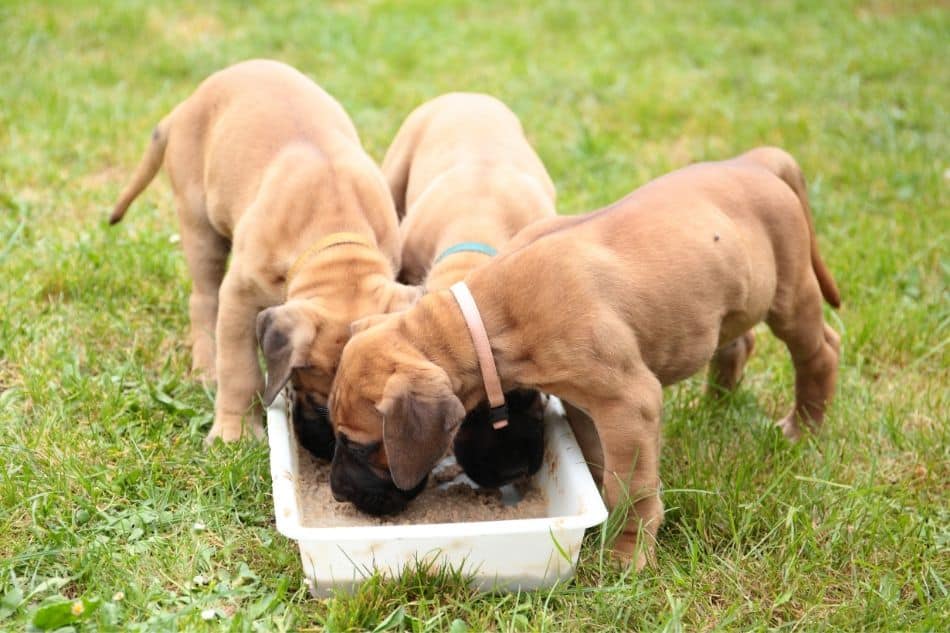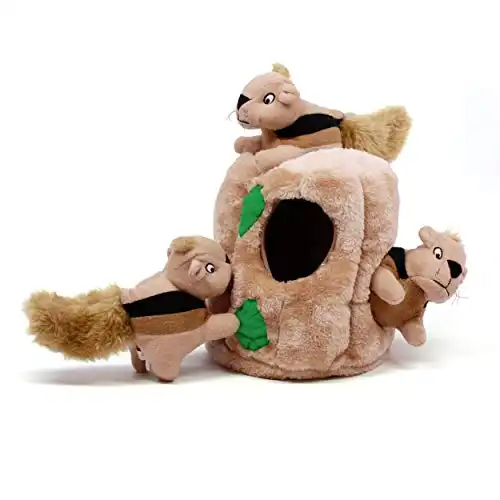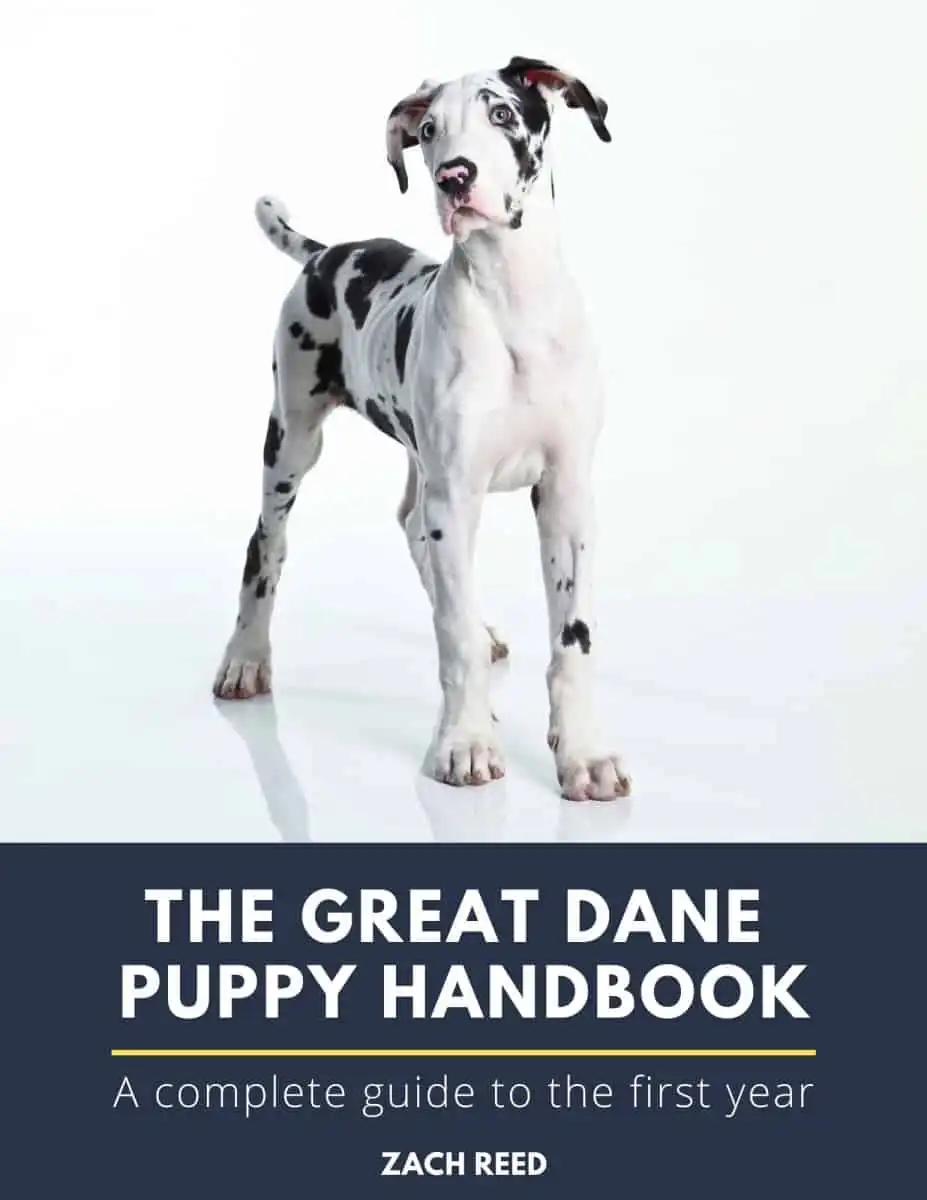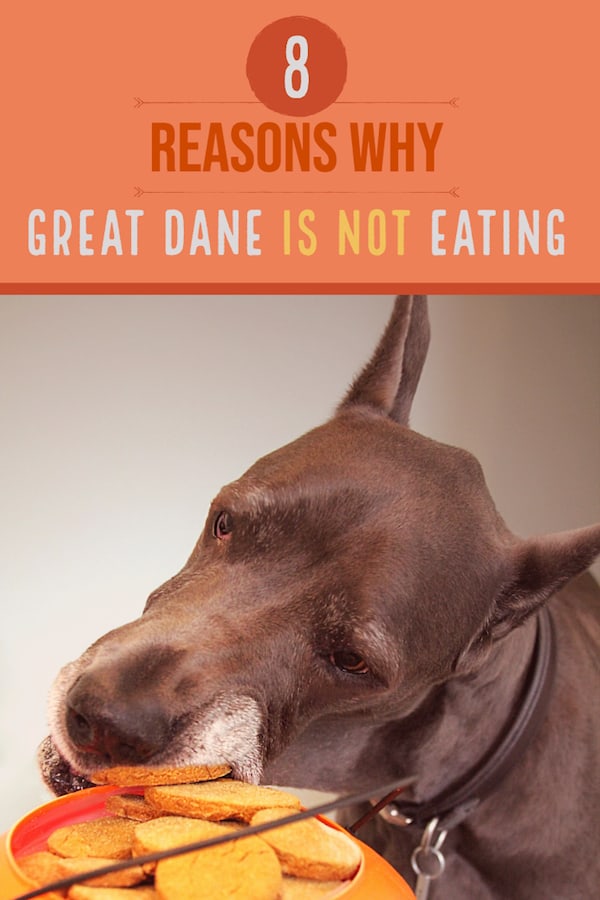
Discover why your Great Dane may not be eating and learn how to address this concerning behavior. This article offers insight into potential causes and solutions to get your gentle giant back to healthy eating habits.
The most common reasons why Great Danes don’t eat their food include stomach sensitivity, dental problems, changes in activity level or hormones, overfeeding, illness, anxiety, and vaccines or medications.
Let’s take a look at all of the potential sources for why your Great Dane isn’t eating to see which one(s) might be a factor for your dog!
1. Most Likely Cause – Sensitive Stomachs
Some pets just have more sensitive stomachs than others. This also holds true for a Great Dane. First, check all areas the dog has access to for anything that they might have accidentally eaten.
Unlikely food choices, like a piece of trash or other non-edible items, might be causing an upset stomach.
If an item has been swallowed, keep an eye out for vomiting and passing the item through feces. If the swallowed item hasn’t been passed within 24 hours, call a vet for further instructions.
If nothing has been eaten out of the norm, it might be time to check the quality of food that you are feeding them. Great Danes need to have a good quality diet that is meant for giant breeds.
The lower the quality of food you are feeding, the more likely it is to be packed with “fillers” and can cause gastrointestinal upset.
Lower quality of food also means a lower quality of protein sources. Good quality food will not have by-products or soy-based proteins.
These are especially important for Great Danes, as they are at higher risk of gastrointestinal cancers and joint problems.
If you suspect a highly sensitive stomach issue, it is best to talk to your veterinarian about special diets or allergy testing. Dogs can be allergic or sensitive to certain types of protein and need a change in food.
They could also need a prescription diet to help with sensitive stomachs.
2. Dental Problems
Having regular dental checkups is just as important for our pets as they are for us! Great Danes can get gingivitis, decayed teeth, and tumors on their gums if not routinely brushed and professionally cleaned.
Check your pet’s mouth to look for broken teeth, bleeding gums, or items stuck in between their teeth.
If anything is found, call your vet and make an appointment right away. You wouldn’t want the problem to last for too long and end up with an infection.
Likewise, if you have a puppy that has been losing its baby teeth; the slowdown in eating could be due to sensitivity. Make sure that the teeth are falling out and coming in appropriately.
Loose teeth should not be stuck or have gums swollen around them. Check loose teeth for food stuck under and in between them. They can still get an infection if not properly cared for.
To keep up with oral health in the future, brush your pet’s teeth with pet-approved toothpaste. Also giving chewing dental sticks helps keep gums healthy and strong.
3. Change In Activity Level
Has Fido been getting that afternoon walk he’s so used to? Or has your Great Dane gotten a little older and lost that puppy energy that they once had? Taking a look at his lifestyle and how it may have changed might be the reason why he’s eating less these days.
A simple stroll around the block for older dogs might help get their metabolism back up and burn some unused energy.
If you have a puppy, try doing more walks and exercises to let out energy. While away for longer periods of time, you can give them puzzles and activities to keep them entertained.
Toys that they can chew and play with or toys that have treats inside are great options.
No matter the age, boredom can get the best of any pet.
Extreme changes in activity level could be a sign of other problems. If your Great Dane suddenly becomes less active, try to determine if it’s a depressive cause or an illness.
4. Hormonal Changes
If your Great Dane is not spayed or neutered, this could be the reason for skipping a meal or two. Females in heat tend to not eat as much. If you have an un-neutered male, there might just be a female in heat nearby distracting him.
This will pass soon enough, and regular eating habits should resume. If not breeding your Great Dane, spaying and neutering will help keep this problem from re-occurring.
Likewise, a pregnancy or false pregnancy can cause a female to suddenly become less interested in food.
In the instance of a false pregnancy, always be double sure that it is not possible that she came into contact with a male and instead is having a miscarriage.
5. Overfeeding
It’s easy to do. We get so used to feeding our pets the same amounts of food, that we don’t take into consideration calories out, calories in. Our once spry pups slow down, but we keep feeding them the same amount.
Not only can this cause obesity, but it causes a lot of food to be left uneaten. Try slowly dialing back their daily food intake to see if they start finishing the food while still maintaining weight.
That being said, treats can be the culprit too. If your dog is getting too many treats, he won’t be hungry enough for a full meal. Treats should only make up 10% of your dog’s total calorie intake for the day.
So if the dog consumes 2,000 calories daily, treats should not account for more than 200 calories.
If you’re not sure how much to feed your Great Dane, then I’d recommend taking a look at our feeding article here.
Once you get a better feel for their normal feeding quantity, you can use the auto-ship mechanism of online providers like Chewy.com to ensure that food is delivered in a timely manner.
Let's face it - Danes eat a LOT of food! Save yourself some serious cash by signing up for Autoship and getting an additional 35% off your first one!
We have used and loved their service for years for its convenience and great prices!
6. Illness
Signs of illness in Great Danes can include vomiting, diarrhea, swelling of gums, and fever.
If your pet throws up, it is possible that he is just wary of trying a portion of food that he has thrown up already.
If any signs of illness continue for more than 24 hours, check for recalls on food and contact a vet. Fluids and tube feeding may be recommended to help get your dog’s energy back up.
7. Vaccinations And Medications
If your pet has been recently vaccinated, sometimes a temporary loss of appetite is to be expected.
As long as eating returns to normal within 24 hours there is no cause for concern.
Also, check any medications your Dane is on for possible side effects. And if these side effects continue, it is best to talk to your veterinarian about it.
They may want to switch medications or cut back on dosing.
8. Anxiety
Our Great Danes can be creatures of habit. If too much changes too fast, they can become overly anxious. Keeping to a good routine during big times of change can help.
Change happens and we can’t stop it! But, we can help our pets adjust as much as possible.
Try adding in some extra comfort like talking to them or cuddling them to soothe their nerves. Keeping as much of the daily routine the same as possible and changing things a little bit at a time can help.
Talk to your vet if you believe separation anxiety or other anxiety behavioral issues become more apparent. These can be serious and lead to other problems later if untreated.
What If They Continue To Not Eat?
You should never force-feed a pet. If they continue to not eat, it is always the best advice to go to a vet. There they can draw blood, do X-rays, and make a proper diagnosis.
So much could be wrong that the average person cannot detect. They are paid, professional doctors, who have spent years training to treat your pet.
In the meantime, there are a few things you can do to help encourage eating.
- Split food across 2 meals per day instead of 1
- Take multiple walks to keep their activity level and metabolism up
- Mix a small amount of wet dog food with the kibble
- If a sore tooth is likely the culprit, soften the food with water or serve boiled chicken and rice until it goes away
- Try feeding in a different area of the house, or away from other pets
- Refuse any treats until your dog eats a real meal
The Great Dane Puppy Handbook takes all of the need-to-know Great Dane info and packages it together into a single, concise resource. Save yourself time, money, and frustration by avoiding the most common mistakes made by Great Dane owners!
Conclusion on Great Danes Not Eating
There are lots of reasons why your Great Dane could be having a loss of appetite. If it seems to go on for more than 24 hours, the best and safest bet is to call a vet.
The earlier you catch what’s happening, the easier the treatment can be.
Keeping an eye on our pets and knowing their personalities helps a lot when it comes to determining a problem. But sometimes things may go unnoticed. It will be okay in the end as long as proper treatment has been given.
Sometimes dogs just have small phases that they need our reassurance that they will get out of. And sometimes they are just feeding off our emotions. That’s why they are truly man’s best friend!
In addition to diagnosing why they’re not eating, you may also wonder how much it costs to feed an adult Great Dane. Lucky for you, I cover Great Dane food costs here!





Our beautiful Harlequin Great Dane pup is the cutest ever. I do know what you mean about being afraid of odd things. She is terrified of my husband’s guitar. He started playing it and she hid . He put it down and she wouldn’t come out until I put it in another room.
Hi Zach, I have 5 month old puppy who has been quite a problematic eater since the beginning.
Already after a couple of weeks after bringing him home he stopped eating the kibble he has been eating since he was at the kennel. Then we switched to a different kind and that worked ca. 2 weeks – then he stopped eating that too. We decided to mix his kibble with wet food, meat and other things which worked also only for some time. We noticed that he preferred meat so we started slowly giving him only meat. This worked again only for a couple of weeks – after some time he got very picky and ate only what he chose. Additionally, pure meat didn’t agree with his stomach much so slowly we switched to kibble mixed with other things. Now, he hasn’t been eating well for 3-4 days and I can already notice he is getting slimmer. At his growing stage I am a little bit worried and don’t really know what to do to improve the situation. I have been discussing this with several people (vets, great Dane owners, etc.) but haven’t really gotten a tip I could use except for letting him starve a little bit because he should start eating at some point. Do you have any experience of this? Could you maybe provide me with some tips? Thanks. Of course, if you need some more details I am more than happy to provide.
Jakub